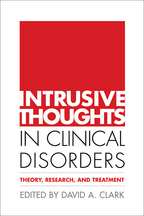Intrusive Thoughts in Clinical Disorders
Theory, Research, and Treatment
Edited by David A. Clark
Hardcover
Hardcover
orderOctober 8, 2004
ISBN 9781593850838
Price: $47.00 255 Pages
Size: 6" x 9"
“A comprehensive summary of cognitive theory on intrusive thoughts, with information that will be useful to researcher and clinician alike. It is compelling in its ability to stimulate the reader to think about how the thoughts that underlie disorders are shaped and controlled. Researchers will appreciate the descriptions of research tools and methods. Clinicians will benefit from the ample attention paid to the clinical applications of current theory.”

—Psychiatric Services
“Cognitive therapy begins with a conceptualization of the individual and this book offers a valuable insight into the role of intrusive thoughts in a range of disorders. These are important concepts to include in our case conceptualizations.”

—Cognitive Behavioral Therapy Book Reviews
“Too many young clinicians are planning treatment without formulating causation of an individual patient's symptoms. This book counteracts that tendency (to make a DSM-IV diagnosis and jump to a manualized approach). It takes one very important symptom—intrusive thoughts—and examines it in several disorders and from many perspectives. The book will be very helpful in teaching therapists how to think about what causes each of the several presented complaints.”

—Mardi J. Horowitz, MD, Langley Porter Psychiatric Institute, University of California, San Francisco
“This book highlights the ubiquity of unwanted mental activity, a facet of cognition that is orthogonal to the pervasive categorization of thoughts as positive or negative. It is a 'must read' for researchers, clinicians, and students eager to understand why mental control and suppression are bound to fail in dealing with these intrusions, and how—while it may seem counterintuitive—approaches that encourage patients to develop a curious, detached awareness of these thoughts have proven helpful across a host of clinical problems.”

—Zindel V. Segal, PhD, Department of Psychiatry, University of Toronto, Canada
“This volume provides a highly valuable survey of the research on intrusive thoughts in several clinical states, including depression, anxiety disorders, psychosis, and sexual disorders. It will be useful to clinicians, to instructors in graduate and upper-level undergraduate courses in clinical psychology, and to researchers in social, personality, and cognitive psychology.”

—Susan Nolen-Hoeksema, PhD, Department of Psychology, Yale University
—Psychiatric Services
“Cognitive therapy begins with a conceptualization of the individual and this book offers a valuable insight into the role of intrusive thoughts in a range of disorders. These are important concepts to include in our case conceptualizations.”
—Cognitive Behavioral Therapy Book Reviews
“Too many young clinicians are planning treatment without formulating causation of an individual patient's symptoms. This book counteracts that tendency (to make a DSM-IV diagnosis and jump to a manualized approach). It takes one very important symptom—intrusive thoughts—and examines it in several disorders and from many perspectives. The book will be very helpful in teaching therapists how to think about what causes each of the several presented complaints.”
—Mardi J. Horowitz, MD, Langley Porter Psychiatric Institute, University of California, San Francisco
“This book highlights the ubiquity of unwanted mental activity, a facet of cognition that is orthogonal to the pervasive categorization of thoughts as positive or negative. It is a 'must read' for researchers, clinicians, and students eager to understand why mental control and suppression are bound to fail in dealing with these intrusions, and how—while it may seem counterintuitive—approaches that encourage patients to develop a curious, detached awareness of these thoughts have proven helpful across a host of clinical problems.”
—Zindel V. Segal, PhD, Department of Psychiatry, University of Toronto, Canada
“This volume provides a highly valuable survey of the research on intrusive thoughts in several clinical states, including depression, anxiety disorders, psychosis, and sexual disorders. It will be useful to clinicians, to instructors in graduate and upper-level undergraduate courses in clinical psychology, and to researchers in social, personality, and cognitive psychology.”
—Susan Nolen-Hoeksema, PhD, Department of Psychology, Yale University



